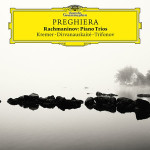|
Back
03/21/2017
“Preghiera”
Sergei Rachmaninoff: “Preghiera” (arr. F. Kreisler from Piano Concerto n° 2 in C minor, opus 18, 2nd movement) – Trio élégiaque n° 2 in D minor, opus 9 – Trio élégiaque n° 1 in G minor
Gidon Kremer (violin), Giedrė Dirvanauskaitė (cello), Daniil Trifonov (piano)
Recording: Trifolion, Echternach, Luxembourg (May 1-3, 2015) – 66’48
Deutsche Grammophon #0289 479 6979 – Liner notes in English, German and French (Distributed by Verve Label Group)

   
Violinist Gidon Kremer wanted to celebrate his 70th birthday by playing Rachmaninoff chamber music on tour with his Kremerta Baltica cello soloist, Giedrė Dirvanauskaitė and Russian pianist Trifonov who at age 24 possesses an interpretive maturity that has made him one of the most in-demand young piano soloists on the international circuit. Fortunately for those who didn’t hear this trio live, they also went into the studio to record the composer’s innovative élégiaque trios.
This specific Rachmaninoff repertoire obviously means a lot to Kremer as an interpretive artist and one guesses, academically and emotionally. Kremer states in the CD booklet his approach to this repertoire is to “convey the energy in the notes” with “companions-interlocutors who can help me and with whom I can converse in the language of music.”
The recording opens with violinist-composer Fritz Kreisler’s collaboration with Rachmaninoff on their co-composed Preghiera and the composers lacing inside the much vamped theme from Rachmaninoff’s Piano Concerto n° 2. Kreisler often worked in concert with famous melodies by other composers for encore miniatures. Trifonov and Kremer imbue it with intimacy and a cathartic eloquence. Kremer’s violin sustains the taut, jarring tonality, while Trifonov essays a warmer percussive framework that actually neutralizes that famous passage into something more substantive.
Preghiera proves an entrancing prologue to the main work on the recording, Rachmaninoff’s three movement Trio élégiaque n° 2 in D minor. It is the composer’s ‘mémoire d’un grand artiste’ elegy to Tchaikovsky, composed by a grief-stricken Rachmaninoff in the aftermath of Tchaikovsky’s death in 1893. Trifonov is instantly hypnotic in the solo piano opening movement: a dark, dirge-like passage gives way to a progressive musical dialogue, a shadowy musical drama that this trio conjures with warmth and restraint. The most elegiac second movement, with its searching, cathartic atmosphere, is luminously articulated. By the third movement the music, indeed, becomes the conduit for the captivating interpretive dialogues essayed by Trifonov, Dirvanauskaitė and Kremer.
The single movement, Trio élégiaque n° 1 in G minor, was composed by a 19 year old Rachmaninoff when he was still a music student and in homage to a very much alive Tchaikovsky. Rachmaninoff directly reverences a piano motif from Tchaikovsky’s Piano Concerto n° 1, but this early work, admirably, is not derivative at all. It proves a vibrant and potent showpiece for this trio: Kremer’s crystalline delicacy on the lead lines, Dirvanauskaitė in sonorous cello counterpoint and Trifonov shifting gears masterfully.
In the liner note essay, “Virtuosity with Depth”, Bjorn Well observes that this trio seeks to “unveil the truths and messages hidden in the music.” And the sincerity of this [notion] seems evident on these tracks, impeccably engineered by Vilias Keras and Aleksandra Kerienė.
Lewis J. Whittington
|